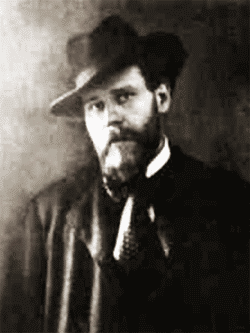Memories of Maximilian Voloshin: portrait of poet, artist and thinker by contemporaries.
From Diakonov's Recollections of Voloshin

The reminiscences that Diakonov wrote about Voloshin are interesting because they help us better understand Voloshin's multifaceted nature. In the spring of 1896 Diakonov enrolled in the Feodosiya gymnasium, which Voloshin was by then finishing. Immediately after enrolling, Diakonov took part in the celebrations honoring Aivazovsky, since Aivazovsky was the trustee of that gymnasium.
During the festivities, when all the gymnasium students were lined up according to a military principle – each group of younger students had a leader chosen from the older ones – Diakonov was able to make out his future classmates. He notes that among them he immediately singled out one student. He was notable for a certain excess of plumpness and, which especially pleased Diakonov, a long hairstyle. The length of this student's hair far exceeded the limits allowed at that educational institution. When he asked the name of the remarkable student, Diakonov was told — Kirienko-Voloshin.
Thus occurred his first, indirect acquaintance with Max Voloshin. Who later became a fairly significant creative figure, Maximilian Voloshin stood out from the crowd from childhood, attracting attention. One wanted to look at and analyze him. He almost embodied Delacroix's painting, so dynamic and vivid a person was he. However, even Eugène Delacroix with his abundance of half-tones could not faithfully reflect all the facets of Voloshin's nature.
Both classmates and the school's teachers noted Voloshin's gift as a poet and called him nothing less than "a poet by God's grace." In addition to his talent, Voloshin possessed an astonishing magnetism and integrity of character. All this gave Voloshin authority in the gymnasium and made even the strictest teachers reckon with him.
Many younger-class students, like Diakonov, looked up to this authoritative upperclassman as a model to emulate. They all seemed to believe that a great future awaited not only Voloshin's poems but also portraits of Maximilian Voloshin. Diakonov also left some notes about Voloshin's mother, who, he asserts, was unlike the average ladies of that era. She was notably independent, made all decisions herself, ran the household, and even rode horseback in men's clothing. Knowing all this, one cannot help but begin to understand where Voloshin's independent nature came from.